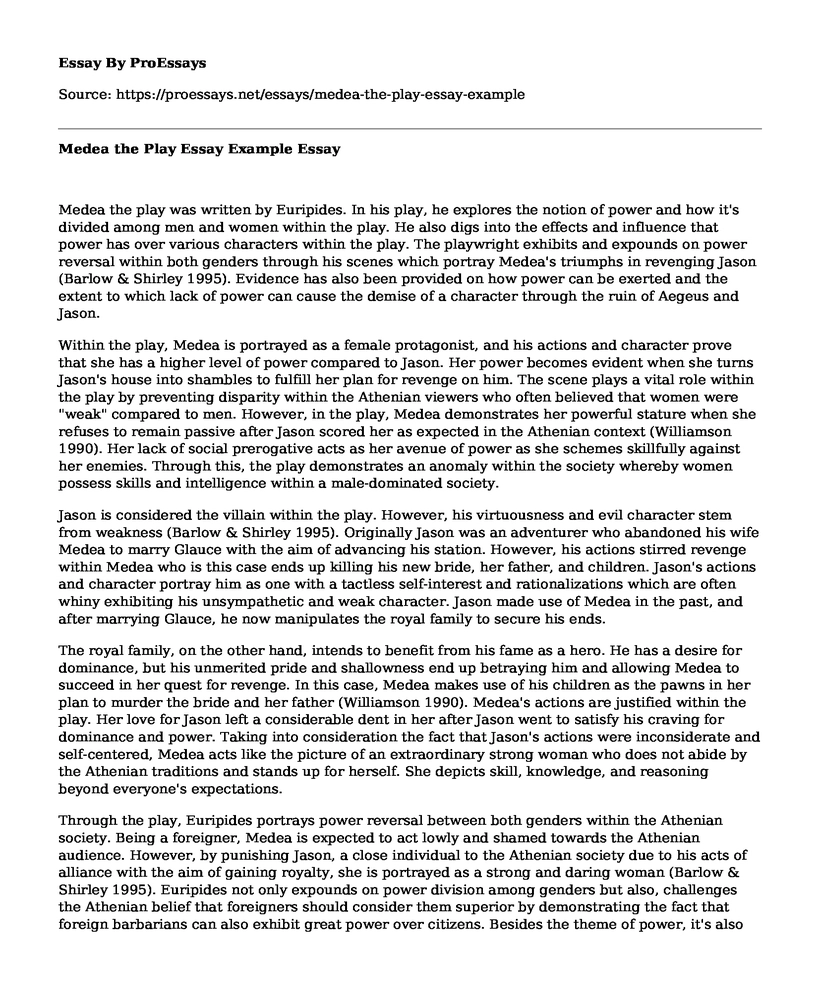Medea the play was written by Euripides. In his play, he explores the notion of power and how it's divided among men and women within the play. He also digs into the effects and influence that power has over various characters within the play. The playwright exhibits and expounds on power reversal within both genders through his scenes which portray Medea's triumphs in revenging Jason (Barlow & Shirley 1995). Evidence has also been provided on how power can be exerted and the extent to which lack of power can cause the demise of a character through the ruin of Aegeus and Jason.
Within the play, Medea is portrayed as a female protagonist, and his actions and character prove that she has a higher level of power compared to Jason. Her power becomes evident when she turns Jason's house into shambles to fulfill her plan for revenge on him. The scene plays a vital role within the play by preventing disparity within the Athenian viewers who often believed that women were "weak" compared to men. However, in the play, Medea demonstrates her powerful stature when she refuses to remain passive after Jason scored her as expected in the Athenian context (Williamson 1990). Her lack of social prerogative acts as her avenue of power as she schemes skillfully against her enemies. Through this, the play demonstrates an anomaly within the society whereby women possess skills and intelligence within a male-dominated society.
Jason is considered the villain within the play. However, his virtuousness and evil character stem from weakness (Barlow & Shirley 1995). Originally Jason was an adventurer who abandoned his wife Medea to marry Glauce with the aim of advancing his station. However, his actions stirred revenge within Medea who is this case ends up killing his new bride, her father, and children. Jason's actions and character portray him as one with a tactless self-interest and rationalizations which are often whiny exhibiting his unsympathetic and weak character. Jason made use of Medea in the past, and after marrying Glauce, he now manipulates the royal family to secure his ends.
The royal family, on the other hand, intends to benefit from his fame as a hero. He has a desire for dominance, but his unmerited pride and shallowness end up betraying him and allowing Medea to succeed in her quest for revenge. In this case, Medea makes use of his children as the pawns in her plan to murder the bride and her father (Williamson 1990). Medea's actions are justified within the play. Her love for Jason left a considerable dent in her after Jason went to satisfy his craving for dominance and power. Taking into consideration the fact that Jason's actions were inconsiderate and self-centered, Medea acts like the picture of an extraordinary strong woman who does not abide by the Athenian traditions and stands up for herself. She depicts skill, knowledge, and reasoning beyond everyone's expectations.
Through the play, Euripides portrays power reversal between both genders within the Athenian society. Being a foreigner, Medea is expected to act lowly and shamed towards the Athenian audience. However, by punishing Jason, a close individual to the Athenian society due to his acts of alliance with the aim of gaining royalty, she is portrayed as a strong and daring woman (Barlow & Shirley 1995). Euripides not only expounds on power division among genders but also, challenges the Athenian belief that foreigners should consider them superior by demonstrating the fact that foreign barbarians can also exhibit great power over citizens. Besides the theme of power, it's also evident that elements of passion and betrayal have also played a significant role in encouraging Medea to murder for revenge. Betrayal transformed the passion that Medea has for him into hatred and desire for revenge.
She is positioned in a dilemma when her character of extreme behavior and emotion caught up with her. The fact that she had sacrificed all for Jason, even murdering the innocent children appears to be a minor act forcing her to commit unspeakable acts while trying to avenge what Jason had forced her to endure. She is willing to sacrifice everything that stands in her way from avenging what Jason had inflicted on her, giving the revenge a seductive appeal. Just like Medea's character within the play, all have been through a similar ordeal whereby one is beset by enemies whose power is unfair and protected institutionally (Williamson 1990). Most individuals often fantasize about plotting perfect revenge and the satisfaction it would bring. The play is a masterpiece with the character of Medea stirring up feelings of horror and excitement powerfully making it a complete success.
Works cited
Barlow, Shirley A. "euripides'medea: a subversive play?." Bulletin of the Institute of Classical Studies 40.S66 (1995): 36-45.
Williamson, Margaret. "A woman's place in Euripides' Medea." Euripides, women, and sexuality (1990): 16-31.
Cite this page
Medea the Play Essay Example. (2022, Sep 18). Retrieved from https://proessays.net/essays/medea-the-play-essay-example
If you are the original author of this essay and no longer wish to have it published on the ProEssays website, please click below to request its removal:
- Essay Example on Evaluation of Mary Shelley's Frankenstein
- 7 Business Writing Tips Essay
- Symbolism and Perspective Comparison Between Araby and The Horse Dealer's Daughter
- Essay Sample on Soviet Union's Rise: Stalin's Totalitarian Policies & WW2 Impact
- Literary Analysis Essay on Pride and Prejudice: Does Mr and Mrs Bennet Good Parents?
- Essay Sample on White Rappers: Guests in the House of Hip-Hop
- Uncle Tom's Cabin: African American Representation in 19th Century - Essay Sample







